- Home
- Peter Rimmer
Echoes from the Past (The Brigandshaw Chronicles Book 1)
Echoes from the Past (The Brigandshaw Chronicles Book 1) Read online
Echoes from the Past
First book in the Brigandshaw Chronicles
Peter Rimmer
Second Edition
This novel is entirely a work of fiction. The names, characters and events portrayed in it, whilst at times based on historical figures and events, are the work of the author's imagination.
Published by Kamba Publishing, United Kingdom
First Edition published January 2015
Second Edition published July 2015
Copyright © Peter Rimmer 2015
Peter Rimmer asserts the moral right to be identified as the author of this work.
All rights reserved. No part of this publication may be reproduced or transmitted in any form or by any means, electronic or mechanical, including photocopy, recording, or any information storage and retrieval system, without permission in writing from Kamba Publishing.
Contents
Book 1 – In the Beginning
Chapter 1 : July 1887
Chapter 2 : February 1888
Chapter 3 : 1889 December
Book 2 – The Occupation
Chapter 1 : September 189
Chapter 2 : April 1891
Chapter 3 : June 1891
Book 3 – The First Chimerenga
Chapter 1 : September 1895
Chapter 2 : November 1895
Chapter 3 : March 1896
Book 4 – Shifting Sands - The first cracks in the British Empire
Chapter 1 : July 1897
Chapter 2 : December 1897
Chapter 3 : June 1898
Book 5 – War
Chapter 1 : October 189
Chapter 2 : November and December 1899
Chapter 3 : December 1899
Chapter 4 : January 1900
Chapter 5 : February 1900
Chapter 6 : June 1900
Book 6 – The Bitterenders
Chapter 1 : September to October 1900
Chapter 2 : March to April 1901
Chapter 3 : May 1901
Chapter 4 : June 1901
Book 7 – Revenge
Chapter 1 : July 1901
Chapter 2 : August 1901
Chapter 3 : September 1901
Epilogue
Peace
Principal Characters
Glossary
Author's Note
About the Author
Also by Peter Rimmer
Connect with Peter Rimmer
Book 1 – In the Beginning
Chapter 1: July 1887
The pony grazed softly. Small bells clung to the reins and round her neck. Opposite the pony, on the other side of the forest glade, a black stallion of seventeen hands stood aloof, firmly tethered to the bough of a tree. Both animals were free of their saddles.
The great oak spread roots above the ground bigger than the thickest boughs. Between the half-submerged roots green moss had grown and lying on the moss, one elbow propped comfortably, Emily Manderville watched the small white and grey butterfly that was sucking salt moisture from the brow of Seb Brigandshaw, the butterfly’s wings opening and closing in ecstasy. He was fast asleep on his back, his lips fluting gently to the rhythm of his breath. They had been alone for hours and had forgotten the other world, as they had done since childhood.
"She said what?" shouted Captain Brigandshaw to his eldest son.
"She said she would marry a Brigandshaw but only Seb," said Arthur.
"She’ll do what her father tells her. Why didn’t you sweep the girl off her feet? She’s sixteen. You’re thirty. You should know what to do. Manderville wants you as a son-in-law. You and your inheritance. My money. They’d laugh at a seventeen-year-old who has lived in the clouds all his life. Where is the brat?"
"Why don’t we send him on a long voyage? The Indian Queen is sailing tomorrow night, father."
"Where is he?"
"When Seb goes riding he says nothing. Probably meeting Emily. They have secret places."
"I want him in my study when he comes home. Have Walker pack his bags. Who’s captain of the Indian Queen?"
"Doyle."
"First port?"
"Las Palmas. She is due in Bombay at the end of April. The return voyage is eighteen months."
"Should be long enough. Write Doyle a letter from me and I’ll sign it. I will not have my children gainsaying me. We Brigandshaws are on the way up in the world. Manderville’s title goes back to the twelfth century, so I’ve heard. Women have no right to choose their husbands. They make a mess of it. Marriage is a business."
Seb woke to the butterfly’s flight and smiled into Emily’s green eyes, the eyes with orange flecks he knew so well. He was at peace with his world. Her long black hair had come down on the ride into the woods, her small red hat caught by a branch of a waiting tree. Her white blouse with the long puffed sleeves was made of a soft silk and the black riding skirt of leather. She rode side-saddle. Brown riding boots covered her legs.
"You want to tell me what you’re thinking?" he asked.
"No."
Seb sat up and wrapped his arms around his knees, checking his horse instinctively. The animal looked back at him with large, wet eyes the colour of slate. The horse winked at him, the velvet lash flashing the long delicate eyebrow. A wood pigeon called from somewhere deep in the trees and was answered far away by its mate.
"My father wishes me to marry Arthur," said Emily quietly.
"ARTHUR! What are you talking about? You and I have been inseparable since childhood."
"Father says I am no longer a child. He wants a safe, rich marriage before I do anything silly."
"Arthur’s old enough to be your father."
"He’s also the heir to Colonial Shipping."
"I’ll get a job with them. Become a ship’s captain. Commodore of the Fleet. James’s going into the army when he comes down from Cambridge and Nat is already in the Church. Arthur may own Colonial Shipping one day but he won’t be able to run it. All the time he tells father what father wants to hear. He manipulates. Lies when it suits him. Flatters when he has something to gain."
"I told father I would only marry one Brigandshaw and that’s you, Seb! We’ve known that all our lives. Why should growing up change anything?"
"I leave school next term and I’ll ask father for a job. I’ll make myself so indispensable he’ll have to leave me shares. Mother will be on my side."
"Your mother is always on your side."
"And she likes you, Em. I know she thinks we belong together."
"But men always decide. We can’t do anything in life without our father’s blessing. If only my mother was alive. If only I had some sisters. They wouldn’t worry about us. We wouldn’t be important to them."
"I’m not important to father."
"But I am. I’m his only child."
"You can’t inherit his title so why does he want you to marry Arthur?"
"I don’t know. I’m hungry. Let’s pick some blackberries."
"I have fresh bread and cheese in my saddlebag. Pickled onions, the best Walker ever made."
"Why didn’t you tell me earlier?"
"Because we would have eaten it all by now. We’ll take the horses to the brook to drink."
Emily watched him place the blanket over the stallion's back and throw up the heavy saddle. From the rear he was so tall and thin, the ponytail of his hair brushing the nape of his neck. Braces held up his riding breeches that clung to his body. It had all changed. Now she wanted more than a kiss. The shudder began around her lips and finished at the base of her throat. He was strapping underneath the belly of his horse, bending
his tight rump to her.
"You got that blanket on your pony? Leave the saddle to me," he said without turning round.
She watched him a moment longer and then did as she was told.
The grotto overlooked the brook. Water trickled down the side of the slate walls, moss clustered in the nooks and crannies. A raised part of the floor was soft with green moss and ferns grew thickly at the entrance, watching the gently running water meandering through the woods. The stallion and the pony were drinking.
They had a world of their own.
Long afterwards, Seb questioned whether the fear of separation had drawn them to their climax, instinct stronger than upbringing. Emily felt little pain and afterwards they slept on the thick bed of moss and the late afternoon slipped towards evening and the last low sun, beaming through the trees into their grotto, woke them to reality.
With only happiness they saddled the horses and began the ride through the soft evening, smelling the secret scents of flowers as the bridle path took them out of the trees. At the edge of the wood, they heard the echoes of village cricket bringing them back to the world of men. They parted; Emily for Hastings Court and Seb for the house of his father.
Arthur was waiting for him. Next to the front door two portmanteaus were packed. In the courtyard the family horse and trap was waiting, the junior groom seated on the bench.
"Where the hell have you been?" said Arthur annoyed by Seb’s grin.
"Riding the forest."
"Father’s waiting in his study."
"Why are my bags packed?"
"Father is waiting."
Seb walked down the passage without seeing the dark pictures on the wall. His mother was in London and he felt alone.
"You have been seeing Emily again," shouted his father.
"No, sir."
"Don’t lie to me."
"Yes, sir."
"She is going to marry Arthur."
"She says she is going to marry me."
"Don’t talk such poppycock. You’re seventeen. Still at school. She will do as she is told. So will you. The Indian Queen sails from London docks on tomorrow evening's tide. You, young man, will be on board. You are to leave now with Arthur who will make sure you do what you are told."
"What about mother, sir?"
"She will be told of your insolence and the consequence. You are interfering in things you don’t understand."
"But I do understand, sir."
"Get out of my sight."
"Yes, sir."
"And don’t disobey Captain Doyle or the consequences will be far more painful than they already are."
Seb put out his hand to say goodbye but his father turned his back. When he left his father’s study, Arthur was waiting.
"May I go to my room?" asked Seb.
"No. Get in the trap."
"One day Arthur Brigandshaw when I am older and stronger it will give me pleasure to thrash your hide."
Arthur hit him hard, back handed across his mouth.
"I’ll remember that one too. You really don’t like me do you brother?"
"No. I don’t. Get in the trap with your bags and we will be in London before the moon rises."
"She’ll make your life miserable."
"She’ll do what she’s told like every other wife."
"Why my Emily? Or is it because she is my Emily?"
Whilst Seb was sailing on the evening tide, from Prince Albert's Wharf, Captain Brigandshaw was being shown into the grand hall of Hastings Court by an old woman. The ceiling was high above his head, dark in the lofty labyrinth of beams. The flagstone floor echoed with his footfall while the crow shuffled along in her slippers. It was the first time The Captain had been in the grand house on the slopes of the Downs. He was surprised by the pervading smell of damp and decay. There was little furniture in the hall and short pickings in the grand reception room that opened by French doors onto a terrace the length of the south wing of the house: the doors and extra windows had been added long after the original structure. Again, the roof was high above his head, the ceilings frescoed with old art dimmed by the ages to virtual extinction.
A surprisingly young Sir Henry Manderville was standing on the terrace looking out over the fields and woods. The tower of a Norman church was visible some distance behind the woods. A black Labrador dog sat at its master’s feet. There was no sign or sound of Emily or anyone else after the old crone had shuffled off from whence she came. The Captain coughed to announce himself with little effect on the motionless baronet. The dog looked at Captain Brigandshaw with equal disinterest. The sun was down behind the church tower making the old stone livid with a brief moment of light. When it was gone, Sir Henry turned to greet his invited guest.
"Breathtaking," said Sir Henry. "Utterly breathtaking. That I shall miss. Come and sit with me on the wall, Captain Brigandshaw." He had not offered his hand. "That dog would lick an intruder's backside if you’ll excuse my expression, sir. No, Emily is not here. Sadly too many tears so she rode off on her pony. Fine horsewoman, of course…You sent him packing, I trust?"
"On board the Indian Queen and halfway out to sea. My ship sailed on the tide."
"You are sure he was on board?"
"Arthur was there to make certain." The baronet turned to look again for the lost sunset. "Now may we talk about your daughter’s dowry?"
Sir Henry gave a short laugh and bent to stroke his dog’s head. The animal looked back at him with absolute love.
"I bought her for Emily when Em was five. Dogs are far more loyal than people. There won’t be any dowry, Captain Brigandshaw. I have a very different proposition. How much do you know about my family?"
"Your family have been the squires about here for centuries. Everyone knows who the Mandervilles are. You came out with William the Conqueror. Why the house is called Hastings, I presume. Ancient lineage from Norman knights. The Mandervilles built the church over there."
"Opportunists rather than chivalrous knights. Rape and pillage was more their line of business. Nothing wrong with a bit of rape and pillage in this life. Beats hard work. Wherever would the Empire be without the gunboats? No more sales of opium into China to blow their river cities into the water. Provoke a fight and blame the enemy for aggression. You see the mighty are always right. But I digress. Your son, my daughter. The irony is your shenanigans may well have killed my father and I used the American word of slang on purpose. You see I have checked up on you, sir. Your wealth grew from one sailing ship. Fast, I agree but one ship. That one ship made you your fortune which you have traded for a shipping line that sails the oceans of the world. Free trade, we cry! Mother of the free! All a load of rubbish as it’s only free trade if you ship on a British boat and no one is free however much they think they are.
"You came to this southern county from the north, first sailing your ship from Liverpool, the ship bought with the blood money you earned as mate on a privateer in the Caribbean. You bought the Indian Queen at the height of the American Civil War and sailed her into Mobile, Alabama, with guns for the confederacy and brought back cotton for the Lancashire mills. The profits from such dangerous sailing were enormous and sad you were when the North defeated the South. You made a fortune in the Civil War and my father died in that same conflict leaving me his debts.
"My father always had a good cause in mind except his own. Frankly, I think he was running away. He said he was an abolitionist. Hated slavery. Was more of a Republican than a Monarchist despite his title. Away from this pile of ancient stone with its damp walls and leaking roof he was somebody. The English gentleman fighting a just cause. He knew the passion inspired by words that wanted to fight the good fight, someone else’s fight. Throughout history there have been twisted people passionate about other people’s affairs. It is a wonderful thing to fight for a cause, Captain Brigandshaw, but whether the slaves would have done any better back in Africa is a matter of conjecture. Africa, I’m told is sparsely populated. Lands of milk and honey usually over
flow with people. He didn’t even die in a full-scale battle but in a skirmish in some woods. What they said, anyway. Probably died of dysentery in some small-hole of a hospital. Hopefully he killed some southern gentleman before he died to prove his point but still I digress.
"To the point. I am bankrupt. After my father gave his life to free some slave he never met, I found myself master of Hastings Court thinking myself rich which I most definitely was not. I had married when I was eighteen-years-old. I married for the love of a lady who gave me Emily and departed this world. Her family were penniless of course but with Hastings Court as my heritage, the thought of marrying for money had never crossed my mind. Maybe if father had not run off on his crusades he would have had time to explain our poverty and my need to trade our ancient title for money, lots and lots of money, the kind of money represented by Colonial Shipping and its great toiling fleet of ships. You see, Captain Brigandshaw, I have something you want and you have what Emily and I most need. Emily will soon recover from her love and see the larger prospects of life. I love my daughter and even though Sebastian is at seventeen twice the man of Arthur at thirty, I will still strike a trade with you. Your son and heir will have Hastings Court along with my daughter and your heirs will meld into the ancient line of Manderville. Your son will change his name to Manderville-Brigandshaw, a mouthful I know but the generations to come will likely drop the Brigandshaw. Your son's grandchildren will be aristocrats and rich. We will have done something for both our lines. For myself I require a fund of two hundred thousand pounds jointly controlled by our solicitors who will invest in 3% Consols. I will live in Italy from the interest. Upon my death the capital will revert to Arthur if he is still married to my daughter. I was never trained to work for trade. All I have to sell is Emily. If your answer is yes, we can have them married in our church towards the end of September. September is such a lovely month. My mother was married in September. Poor mother. Always frail and always second to father's causes. I think she died of boredom. Don't you agree Captain Brigandshaw? Boredom is the worst affliction on earth. But again I digress."

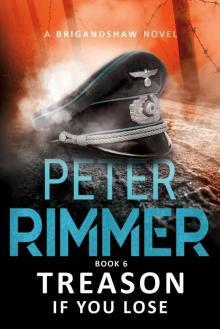 Treason if You Lose
Treason if You Lose Just the Memory of Love
Just the Memory of Love On the Brink of Tears
On the Brink of Tears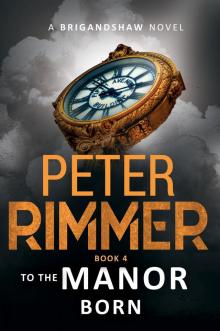 To the Manor Born
To the Manor Born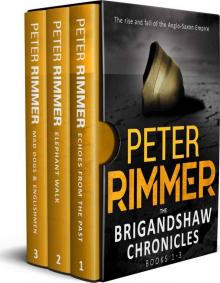 The Brigandshaw Chronicles Box Set
The Brigandshaw Chronicles Box Set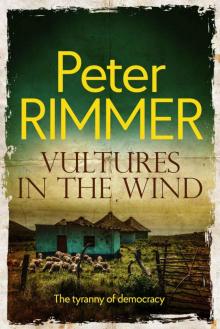 Vultures in the Wind
Vultures in the Wind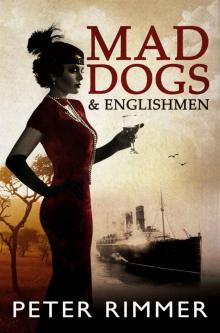 Mad Dogs and Englishmen (The Brigandshaw Chronicles Book 3)
Mad Dogs and Englishmen (The Brigandshaw Chronicles Book 3) Echoes from the Past (The Brigandshaw Chronicles Book 1)
Echoes from the Past (The Brigandshaw Chronicles Book 1) Elephant Walk (The Brigandshaw Chronicles Book 2)
Elephant Walk (The Brigandshaw Chronicles Book 2)